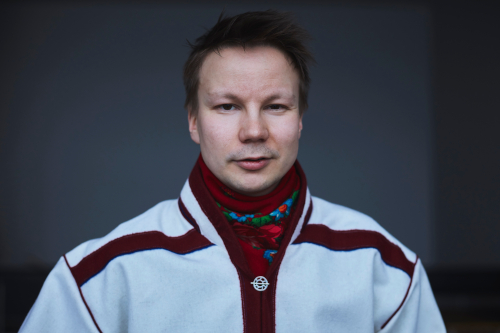The award-winning Samí poet Niillas Holmberg answers HLA’s questions.
Your most recent poetry collection, Underfoot, nominated for the Nordic Council Literature Prize, has been widely praised not only for its aesthetics and formidable language, but also its current topics: ecocriticism, a search of connection with earth, a modern human being and their relation to nature in the contemporary world… What does it mean to be a poet in the 21st century? And how does one reach the audience?
In a world where show business makes crowds reluctant to or even incapable of abstract and symbolic thinking as it feeds people with food already chewed, poetry plays an important role of compensation. Considering the absence of myth in the daily life of a present man, I believe poetry is one of the few things that sparks our brains in areas that otherwise would grow dull. To put it short, poetry can help us feel whole.
There is no single answer to the difficulty of reaching the audience. At least: be brave, be genuine. The growing interest towards spoken word and slam poetry can be seen as a revival. On the other hand, I sense a danger of poetry being dumbed down as a result of aspiration to be understood by a single hearing.
For years you have not only wrote poetry and music, but also been an activist for your people – Sámi people. Do you think that the interest for indigenous people’s culture is rising – globally and in Finland?
It is clearly rising. There are probably myriads of reasons, but I feel that the growing concern over ecological matters is the greatest of them all. The sustainable means of land use of the indigenous peoples are naturally gaining more and more interest.
What are the stereotypes about Sámi that you most often encounter and would like to change once and for all?
Whereas decades ago the Sámi were seen as drunkards, just like all the other indigenous nations were, today the common stereotype seems to be the complaining-Sámi image. As we raise our voices to reject different oppressing phenomena, that are beyond counting, the oppressing sides have developed a rhetoric intended to paint a picture of us as chronically displeased, wining, prejudiced children who don’t know what’s best for ourselves.
What are your inspirations for writing, music? And who are, in your opinion, the most interesting Sámi writers or other artists that everybody should hear about today?
I’ve always been inspired by the tensions evolving from coexistence of old and new. Growing up in a Sámi village affected by the industrial civilization during the last century, this tension, of course, was present to me daily in its various forms. For a writer, this situation presents fascinating psychological dilemmas – and it just might be the reason for ending up on this career path.
From the field of fine literature in Sápmi I’d like to recommend Sigbjørn Skåden. He writes both prose and poetry. Rauna Kuokkanen for nonfiction – she’s one of our brightest political and social thinkers, with decolonisation / indigenisation as her subject. Want to listen to Sámi music? My favorite album right now is Áššu by a band of the same name, with Ulla Pirttijärvi – who taught me when I was a child – behind the yoik vocals. The skolt Sámi film director Katja Gauriloff is a world class film maker. Duodji (our form of handicrafts) is a vital part of Sámi arts; if you’re interested, look for the work of Fredrik Prost.
This is the second time you have been nominated for the Nordic Council Literature Prize. Besides the personal satisfaction, does such a recognition changes author’s life?
It raises interest, one gets more invitations and requests because of it.
What are your plans for the near future? What can the readers expect?
I’m just finalizing the second version of a feature film script which I’ve been working on for a year now together with Katja Gauriloff. As for my plans regarding fine literature, more is due next year. I’ll let people guess for a while longer.
What is your favorite word?
“Dohppii!” The word coming out of my kin’s mouth when a salmon strikes.
What is your least favorite word?
I refuse to write it. Words are magic.
What turns you on creatively, spiritually or emotionally?
Microcosmoses in macrocosmoses.
What turns you off?
Tourism.
What is your favorite curse word?
Beargalak.
What sound or noise do you love?
I love many sounds, the abcense of sounds perhaps even more.
What sound or noise do you hate?
My ringtone.
What profession other than your own would you like to attempt?
Duodji.
What profession would you not like to do?
Politics.
If Heaven exists, what would you like to hear God say when you arrive at the Pearly Gates?
“Champagne?”
